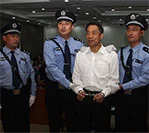CRACKDOWN: Tackling corruption must start from the top as shown by Beijing in its robust snaring of ‘big fish’
In Asia today,never-before taken efforts are being taken to combat the scourge of corruption; the most serious, without a doubt, being that of China’s.
China has a political system that differs vastly from the vast majority of countries in the world. Nevertheless, I would argue that it can still serve as an example of what to (and not to) do in restoring social peace, prosperity and public trust.
FIRST, the Communist Party of China’s Central Commission for Discipline Inspection has netted some of the most high-powered political comrades, military officers and wealthy businessmen in the country.
Among them are Zhou Yongkang, a former member of the Politburo’s ultra-elite Standing Committee and ex-minister of public security. He is touted to be the most senior official ever to have been indicted since 1949.
Malaysians may also be familiar with the bizarre case of Bo Xilai, also member of the Politburo and former mayor of Chongqing, China’s largest direct-controlled municipality. Only Malaysians seem to be able to trump Bo’s case in terms of scandal.
Last week, the son of General Guo Boxiong, vice-chairman of the Central Military Commission and Politburo member during the time of President Hu Jintao, was indicted. It is now expected that charges will be laid against the senior Guo soon.
If all these names and titles are unfamiliar to Malaysians, it might be helpful to think of them as roughly the equivalent of members of our cabinet, Umno vice-presidents and supreme council members.
In China’s case, anti-corruption efforts started at the top. No stone was left unturned; no person was considered untouchable. Members and ex-members of the Politburo’s Standing Committee were not spared.
To be sure, politics may have played a role, even a large role, but there are yet to be serious accusations that the anti-corruption drive has been unjustified or discriminatory. One could hardly expect to snare big fish and not to stir up the pond, mud and all.
SECOND, when President Xi Jinping started the anti-corruption drive on assuming office in late 2012, one of the first things he did was to reduce the Standing Committee from nine to seven members.
Apart from Premier Li Keqiang, he brought in five totally new faces. Among them was Wang Qishan, someone with an extensive financial background, who was appointed the Secretary of the Discipline Inspection Commission.
In the Malaysian context, this could be roughly akin to tasking the anti-corruption drive to a senior cabinet minister, someone perhaps of no less rank than our home minister.
It is important to note that the anti-corruption drive was not left to a subordinate body that could be politically influenced.
As an aside, this appears to have seriously stymied anti-graft efforts in Indonesia, with the cicakbuaya tussle or between corruption-eradication commission (or KPK) officials and the police.
The best anti-corruption organisation, staffed with the best officers, the most funding and equipped with the very latest technologies cannot and will not substitute strong political determination from the very top.
THIRD, as Wang Qishan explains it, China’s anti-corruption drive comprises three stages -or alternatively, has three goals.
Stage One or the first target is where party members would not dare to be corrupt. This is where the “indiscretions” of serving and retired party cadres, Le. their corrupt acts, are investigated, proven and punished.
Stage Two and the second target is where they would not be able to be corrupt. New systems, rules and procedures are established so as not to allow corrupt activity. This can be interpreted as the building of good governance.
Stage Three is where party members would not want to be corrupt and “would not think of it”. The anti-corruption efforts translate to core values in the best of Confucian traditions and ethics.
In my personal assessment, China is about midway in Stage Two. Certainly, lavish lifestyles in China are today viewed with suspicion and scorn, so unlike the totally brazen and reckless behaviour demonstrated just a few years ago.
Wang’s three stages are very useful gauges to assess where other countries, including Malaysia, stand in the fight against corruption. Do those in high political office dare to be corrupt? Are serious efforts made to deny corruption, even those at the very top? Do those who hold office even think about corruption?
Perhaps Malaysians have to think seriously and deeply about these questions. If found wanting, action has to be taken, and China, even though very different, may offer one effective way to tackle it.
Article by Dato’ Steven Wong which appeared in New Straits Times, 10 March 2015.





